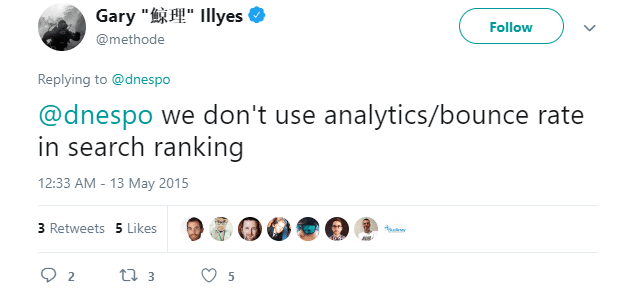Do Bounce Rates Affect Google Rankings?
Bounce Rate Myths Are Common in the SEO World
by Dr. William Sen
The importance of bounce rates to SEO appears unclear to many SEO experts. Do bounce rates really affect the ranking of websites on Search Engine Results Pages (SERP)?
Quick answer: A low bounce rate on any page does not automatically result in high search engine rankings. Likewise, a high bounce rate does not exactly spell doom.Bounce Rates Explained
A bounce as related to web pages describes a user’s quick interaction with a page. In order to consider it a bounce, the interaction with the page has to be short lived. Suppose a website returns a 75% bounce rate figure, this means 75 out of 100 users on the site did not stay long on the website or a certain web page. Quite often, this happens when a user gets on a website through search engine results, only to find that they do not need to be on the website, so they use the back button to return to the Search Engine Results Pages.
Does Google Punish Websites with High Bounce Rates?
Fact is, is Google is actually not able to determine a page’s relevance to a user through the bounce rates! I have interacted with several top SEO experts s who have talked extensively about bounce rates and how they affect rankings. After considering much of what they discussed, I came to the realization that bounce rates could not affect rankings. This sounds debatable but can become clearer to you, if you have some knowledge about computer science and information economics.
A user’s interaction with a page that comes up on search results generates a click. The implemented Google Analytic code records this interaction. But one thing nobody is sure of, is whether Google makes use of its analytic code to determine the bounce rate.
This should bring an important question to mind:
How can the bounce rates be calculated if a web site is not using Google’s analytics code on websites?
It is also important to ask if the roles played by bounce rates are positive or negative with Google’s algorithm only if the analytics code has been installed. Also, if Google Analytics code is used to measure bounce rates, wouldn’t it be safe not to use the Google Analytics code to forestall low rankings from Google? Think about these things.
Let us find answers to these questions:
The user retention rate can only be determined after a user has opened a different page on a website. When there is no subsequent click on another page, it is not possible for Google to measure how much the user has been on the previous page. This is made clearer when you examine the JavaScript code for the Google Analytics code. The fact that the JavaScript code does not have the AJAX feature (such as using jQuery or similar) makes it only able to measure clicks alone. It does not have the capacity to measure user activities on a page.
The points is, Google’s us unable to measure how long a user stays on a page without a second click is initiated within the Google Analytics ecosystem. Makes sense?
Bounce Rates often confused with Pogo Sticking
What many SEOs have confused for Google bounce rates is actually known as Pogo Sticking. Pogo Sticking actually describes a user’s activity when they click on search results and then return to the results page without interacting further with the website or page. Many SEOs believe that once the user gets back to the search results page, Google will be able to figure that they have found the content uninteresting. From discussions and from experience, I have found this to be untrue as well.
How so?
The truth is, when using search engines, many users do not stick to one page. They’d rather open several tabs and return to the results page to check for more information until they find one that is suitable for them. You cannot base this activity on the fact that the user has found the page uninteresting especially since Google cannot record the number of tabs opened by a user.
No search engine can accurately predict user activity as it isn’t generic in any sense. Even when some users find the content on a page useful, they could bookmark such page, share it on social media, save the page for future use and return to the SERP—so it isn’t exactly like they do not find the page interesting. I have also seen this play out in many situations especially with my clients using Analytics Reports which shows that high bounce rates are not in any way responsible for negative rankings. I have seen several keywords and pages remain at top SERP positions even after several years and their bounce rates still appear to be 90% or higher.
When considering parameters for determining the rank of a page, the page’s bounce rate is not one of the factors under consideration by Google.
Suppose bounce rates are considered as a criteria for ranking, Google will have to cater for websites with the Google Analytics code using different yardsticks in order to accommodate the feature. Google may have to compulsory the use of the Analytics Code to prevent some websites from putting up content that is below par because without it, Google would not be able to monitor the bounce rates of these sites or/and pages. If this existed as a loophole, SEO experts would and explore it to the fullest possible length. This would signal the end for Google Analytics for SEOs, meaning: SEOs would recommend against using the Google Analytics anymore.
It takes us back to information economics and my stance on the matter as depicted above. Google would not make the mistake of using bounce rates as a rank determinant because of its high susceptibility. Gary Illyes, who is a Google Webmaster Trends Analyst, did also explain that bounce rates are not being considered by Google as a rank determinant:

Source: Victoria Cushing at twitter.com/methode/status/598390635041673217
Matt Cutts also shared similar sentiments about bounce rates which sort of lends credence to the fact, even though I do not fully hold Google’s statements true and I do not consider Matt to be a strong member of Google’s developer team despite the amount of educational content he churns out regularly.
What Does Google Consider Instead?
There are many factors acting as rank determinants. Text mining for instance, is one of the mostly used factors for checking the relevance of a website and to determine its rank. Topic distribution across the website also counts as a significant factor for ranking.
Google doesn’t joke with checking for the relevance of a website’s content with user search inquiries. To check accurately, Google makes use of very detailed techniques to check this. For this article, you were able to find this article on the SERP because it talks about SEO and so does the entire website. You may even found it, because somebody linked to this article from another source—which counts as a relevant and valuable backlink.
Evidently, Google considers it as relevant to your search inquiry. The more specific searches you make about any subject, the more detailed results you will get. Posting this article on a website that sells cars for instance will not meet Google’s relevance compliance metrics and would therefore not attain high rankings. There are several factors that determines the relevance of a content and they are much more significant than the bounce rates.
What is the Significance of Bounce Rates?
What are the importance of bounce rates if they do not have any significant impact on the rank of a website, and why should website owners and SEOs be wary of them?
Bounce rates play an important role in several regards as they can help SEO professionals to determine the engagement on the pages. It is from this basis, that we can draw answers to the several questions that have been earlier posited about bounce rate analytics:
- Will the content on a page motivate users to get more engaged with the website?
- How much does teasers, widgets and other engaging elements contribute to user engagements?


 by
by 




